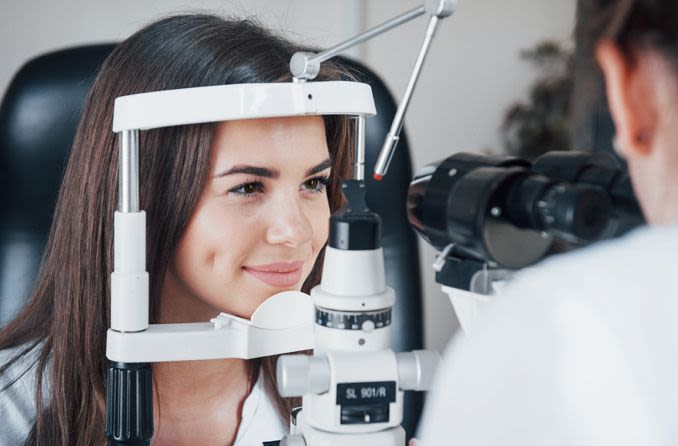Preparing for an eye exam: What to expect

Common questions about eye tests include:
How much does an eye test cost?
How frequently should I have my eyes examined?
What should I bring with me to my test?
These guidelines can help you prepare for an eye test. The first step is finding an optometrist near you.
Eye test cost
Eye tests are available at most optometrist practices, whether they be an independent or part of a national chain or group.
The cost of an eye test can varies based on factors including:
Whether the examination is performed by an optometrist or an ophthalmologist
The tests that are included in the examination
Whether it includes a contact lens fitting or other contact lens-related services
The cost of an eye exam can range widely depending on these factors but for a standard visit to the optometrist Medicare covers 85% of the basic fee. Often pensioners or other people holding Health care cards will be bulk-billed by the practice so there is no gap to pay.
Eye tests for contact lenses can cost more than routine exams that check your general eye health and update your glasses prescription.
When comparing how much an eye exam costs, be sure you are comparing "apples to apples." A comprehensive eye test should include at least the following:
A review of your personal and family health history and any history of eye problems.
Evaluation of your distance and near vision
Evaluation for being short sighted, long sighted or the presence of astigmatism
Near vision testing to determine if you have presbyopia and need progressive lenses
Evaluation of your eyes' ability to work together as a team
If you are over 40 or have a family history of glaucoma; an eye pressure test and examination of the optic nerve to rule out glaucoma
Examination of the interior of your eyes to rule out other eye problems, such as cataracts and macular degeneration
Contact lens exams typically include additional tests and procedures beyond those noted above.
Be sure to ask what tests are included when you obtain information about eye exam costs. Today there are sophisticated, computerised tests like OCT (ocular coherence tomography), digital retinal photos, etc. — that may be included in a higher exam fee.
Certain "intangibles" also should be considered when you compare eye exam costs. These might include: the professionalism and friendliness of the optometrist and staff; the level of training of the dispensing opticians or optical advisors; how long you must wait to be seen; how advanced (or outdated) the exam equipment is; the convenience of the practice; and hours of operation.
It's also a good idea when choosing an optometrist to ask friends for referrals and to "shop around" first via a personal visit to the practice before scheduling an exam.
When to have your eyes examined
Most eye care professionals recommend that you have a comprehensive eye test every two years, depending on your age, risk factors and whether you currently wear spectacles or contact lenses.
Children
Routine eye exams are essential for children to be ready to learn in school, and experts say more than 80 percent of information children receive in classrooms is presented visually.
Children generally should have their first eye exam at 6 months of age, another around age 3, and again just before starting school. Risk-free children should then continue to have their eyes checked every two years until age 18.
Children with risk factors for vision problems may need their first eye exam earlier than 6 months of age and may need more frequent eye tests throughout childhood.
Examples of risk factors include:
History of premature birth or low birth weight
Infection of mother during pregnancy (examples: rubella, venereal disease, herpes, AIDS)
Developmental delays
Turned or crossed eyes (strabismus)
Family history of eye disease
High refractive errors
Physical illness or diseases
Also, children who currently wear glasses or contact lenses should may have more frequent eye tests.
Adults
To maintain a lifetime of healthy vision, adults ages 18 to 60 should have a comprehensive eye test every two years. Older adults (age 61 and older) may need them at shorter intervals.
"At risk" adults should have more frequent exams. Risk factors for adults include:
A family history of eye disease (glaucoma, macular degeneration, etc.)
Diabetes or high blood pressure
A visually demanding occupation or one that may pose hazards to the eyes
Taking prescription or non-prescription drugs that may have visual or eye-related side effects
Previous eye injuries or eye surgery (including cataract surgery)
If you have any doubts about how often you (or your children or parents) should have your eyes examined, ask your optometrist.
What should I bring with me to my eye test?
It is important to bring information to your eye test that will alert your optometrist to risks you may have for eye or vision problems.
In particular, bring a list of any prescription or non-prescription medications you are currently taking or that you took on a regular basis in the past. Include vitamins, herbs and other non-traditional remedies you may use. Also note the dosages you take for each medicine or other substance, and how long you have been taking them.
If you currently wear glasses, bring all pairs of spectacles you wear routinely. If you wear contacts that were prescribed elsewhere, bring a copy of your most recent contact lens prescription.
Finally, prepare and bring a list of questions or concerns that you would like to discuss with the optometrist.
If you are interested in specialty services such as contact lens fitting or laser surgery evaluation, be sure to mention this — both when you schedule your test and when you check in on the day of your appointment.
READY FOR YOUR EYE TEST? The first step in preparing for an eye test is to find an optometrist near you.
Page published on Tuesday, 17 March 2020






